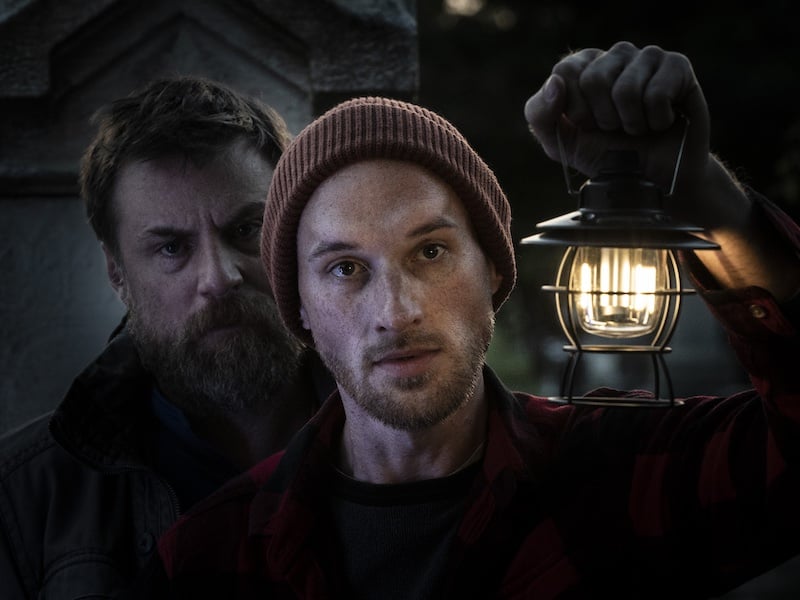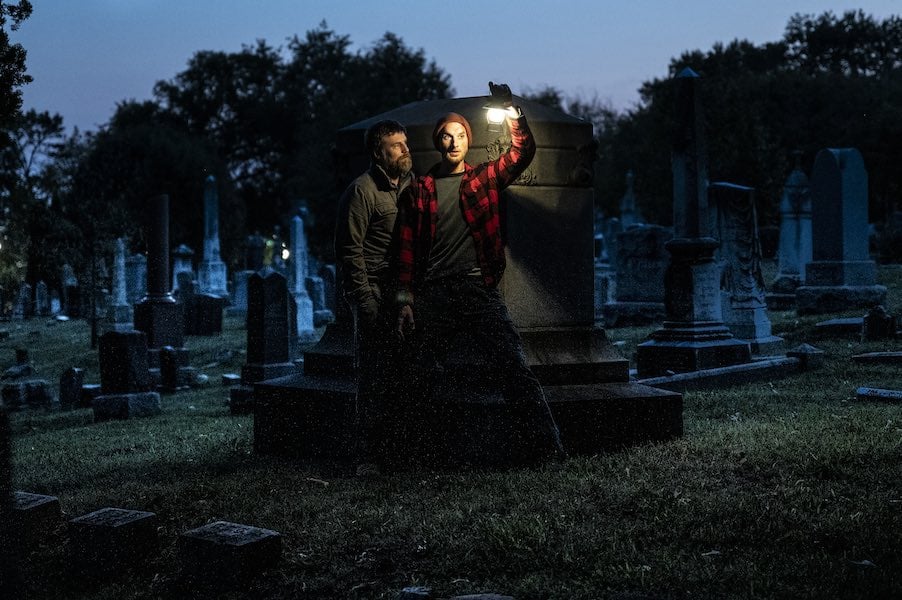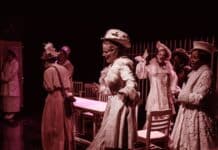Was ever two men cruising more grittily poetical? Was ever homoeroticism in drama more lyrically mythic?
Bob Bartlett’s site-specific play Lýkos Ánthrōpos, performed in a cemetery at night, taps into a dark side of desire on the down low that with astonishing eloquence strips two lusting men down to their lost spiritual selves. They meet clandestinely each month as the moon is nearly full — a burly Stranger and a smaller Young Man. They stay fully clothed, and no sex acts are to be seen, but the loneliness, fear, and dense sexual tension between them — evoked in parables, elliptical discourse, and myth-rich soliloquies — make Lýkos Ánthrōpos not only a spooky horror play but also a quest for sensual solace and authenticity.

The audience (maximum: 30) gathers inside the Congressional Cemetery main entrance (at the juncture of 18th and E Streets SE), flashlights and blankets or fold-up chairs in hand. A guide leads us along a semi-lit cobblestone road and down a steep flight of steps toward a grassy clearing encircled by lanterns where pre-show death metal music can be heard. There, just outside the playing area and amid headstones of buried deceased, we sit for the next 75 minutes as witnesses/voyeurs to a carnal encounter in words.
The Young Man sets the scene with a prolog in which, speaking on behalf of both himself and the Stranger, he sets out for extramarital pickup sex:
If you’re gonna make another mistake, make it where it don’t matter, where no one can see. You’ll feel better — after. Then you can get on back home to the missus — where you only get to be half of you — where you fight so hard to keep the wolf caged.
The title Lýkos Ánthrōpos is Greek for wolfman, and wolf imagery and lycanthropy lore figure prominently and variously throughout the play — such as in the metaphor above for suppressed same-sex desire and as omnipresent predatory danger. Initial interactions between the Stranger (Patrick Kilpatrick ) and the Young Man (Nicholas Gerwitz) have a dominance-vulnerability dynamic, a hunter and hunted vibe, that casts the Stranger as lupine and the Young Man as “little rabbit.” The two actors are well-practiced in these roles — they appeared in the play when it premiered in the woods on a farm two years ago — and between them is a pulse-quickening physicality that tells a haunting story.

We learn the Stranger has been surveilling the Young Man like a stalker, and Bartlett’s depiction of their coming on to each other could be a dick pic exchange:
STRANGER: You got something I want. I got something you want.
YOUNG MAN: I want a lot.
STRANGER: I got a lot.
YOUNG MAN: Show me.
STRANGER: You first.
YOUNG MAN: Right.
STRANGER: You know what I got.
YOUNG MAN: More than me. Well, alright.
But then a sudden shift, as happens often in the script:
STRANGER: Maybe I just wanna be friends.
YOUNG MAN: There’s no chance that’s happening.
STRANGER: Maybe I wanna touch you. You like being touched?
YOUNG MAN: Sure. Who doesn’t?
Rakell Foye did the manly, woodsy costumes, and Alex Levy’s deft direction has the actors move around and outside the playing area like wary adversaries. Time passes by implication. The two have more lunar-timed encounters after the first. And often, the blocking is stunning, as when the Young Man falls to his knees and implores the Stranger:
YOUNG MAN: Tell me what you want, old man. I’ll do it. You ain’t even gotta pay me — unless you’re happy with what you get.
…
STRANGER: I can do whatever I want to you, whatever I need to do. And there’s nothing you can do to stop me. You can call for help — if you think anyone will hear, if you think anyone will come.
YOUNG MAN: No one will hear.
STRANGER: You should run.
YOUNG MAN: No one will come.
…
STRANGER: What do you want to happen?
YOUNG MAN: I don’t want to be alone, anymore.
STRANGER: Are you afraid of me?
YOUNG MAN: Yes.
About mid-play, there is a remarkable passage involving the two men’s shared reverence for the moon, whom the Young Man addresses — as if on personal terms — as Selene. Their praying together to this goddess, whom they deem their mutual protector, shifts their male-male dynamic from combatant to a kind of comrade. The moon they mutually worship seems if not to couple them at least to relieve tension between them. Another striking stage picture takes on site-specific significance when the two sit side by side with their backs against a tree, as if some truce were possible.
The literary exuberance in Bartlett’s writing can at times waft into abstraction, and tonal shifts recur with unaccounted-for abandon, but the core story stays grounded in two sturdy performances that embody and deliver an arresting arc of loneliness and longing and fear.
The show’s simple lighting effects sometimes surpass what a fully staged production can do, as when all the lanterns are extinguished, and, before one’s eyes adjust to the night light, one is plunged into a perfectly pitch-black blackout. At the opening on Halloween, that sent chills.
The sounds of distant sirens, overhead airplanes, and breeze in the trees often underscore by chance the emotion in a moment. But accommodating to those ambient sounds — as well as the need for 360-degree audibility outdoors — the actors project much in shouts. This necessarily leaves them less vocal range for nuance that this supple and fascinating script might allow indoors.
But here in a graveyard, this play is perfectly placed. Inside caged on a stage, it could not possibly play as palpably. It could not say or mean as much.
You’ll get that when you see it.
Running Time: 75 minutes, without intermission.
Lýkos Ánthrōpos plays Thursdays, Fridays, Saturdays, and Sundays at 8:00 PM from October 31 – November 24, 2024, at Congressional Cemetery, 1801 E St SE, Washington, DC. Tickets are $35 and available online.
The program for Lýkos Ánthrōpos is online here.
Lýkos Ánthrōpos
By Bob Bartlett
Directed by Alex Levy
A Stranger: Patrick Kilpatrick
A Young Man: Nicholas Gerwitz
Guide: Hal Kilpatrick
Costume Design: Rakell Foye
SEE ALSO:
Horror play to open on Halloween in historic Congressional Cemetery (news story, October 10, 2024)
Playwright Bob Bartlett on his scary new play in the woods, ‘Lýkos Ánthrōpos’ (interview by Charles Green, October 17, 2022)
See Bob Bartlett’s ‘Lýkos Ánthrōpos’ if you dare (review by Andrew Walker White, October 22, 2022)



